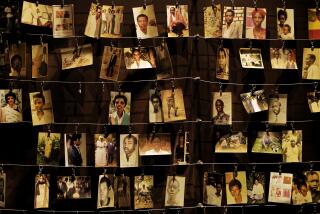All Sides Share Guilt in Bosnia, Christopher Says
- Share via
WASHINGTON — Secretary of State Warren Christopher backed away from the belief that a moral imperative dictates the need for military action in Bosnia-Herzegovina, maintaining Tuesday that no side in the bloody ethnic war can properly claim to be a victim of genocide because all are guilty of atrocities.
Although Christopher told the House Foreign Affairs Committee that the Clinton Administration will continue to advocate air strikes on Serbian military positions and an end to a U.N. weapons embargo so that the Muslim-led Bosnian government can arm itself, he acknowledged that he has been unable to get allied support for the plan and reiterated that Washington will not act alone.
But when Rep. Gary L. Ackerman (D-N.Y.) asserted that “ethnic cleansing” in Bosnia is a moral issue that must be addressed by the United States regardless of the attitude of other countries, Christopher replied: “There are atrocities on all sides.”
As he has in the past, Christopher said that the Serbs--the largest and most powerful party in the conflict--are the worst offenders, having committed systematic rape and other forms of brutality against civilians. But he said Muslims and Croats are guilty of similar kinds of war crimes, a fact that blurs the moral issue.
Christopher’s remarks may be intended to prepare the way for the Administration to avoid direct intervention in Bosnia, despite President Clinton’s argument during the fall campaign that the world has a moral obligation to stop Serbian atrocities.
By toning down the emotional content of the debate, the Administration is apparently seeking to recast the issue as conventional diplomacy in which the United States must weigh the pluses and minuses of becoming more deeply involved.
Officials clearly are concerned that if the public comes to equate the Serbs’ actions in the Balkan conflict with the Nazi slaughter of 6 million Jews during World War II--a parallel some participants in the debate have tried to draw--the Administration might be forced to act, even if it cannot develop a broad international consensus.
“It’s somewhat different than the Holocaust,” Christopher said. “It’s been easy to analogize this to the Holocaust, but I never heard of any genocide by the Jews against the German people.”
Other lawmakers, including California Rep. Ed Royce (R-Fullerton), objected that Christopher was diluting the moral issue and undercutting the Administration’s effort to obtain the support of foreign governments and get U.S. public opinion behind its Bosnia policy.
“In point of fact, the Jewish population . . . at the Warsaw Ghetto did try to fight back, so that does not take away the argument that it was genocide,” Royce said.
Christopher said he will meet in Washington with Russian Foreign Minister Andrei V. Kozyrev on Thursday and French Foreign Minister Alain Juppe on Monday and will talk to other foreign ministers by telephone in search of an international consensus. But he said the differences are profound.
Christopher flatly rejected a proposal by Kozyrev for the U.N. Security Council to impose, by military force if necessary, the U.N.-mediated peace plan that has been accepted by Muslims and Croats but rejected by Serbs.
“Frankly, I’m quite surprised by the position taken by Foreign Minister Kozyrev now--that we should try to do what he calls a progressive implementation of the (international peace) plan after it was turned down overwhelmingly by the Bosnian Serbs,” Christopher said.
More to Read
Get the L.A. Times Politics newsletter
Deeply reported insights into legislation, politics and policy from Sacramento, Washington and beyond. In your inbox twice per week.
You may occasionally receive promotional content from the Los Angeles Times.










